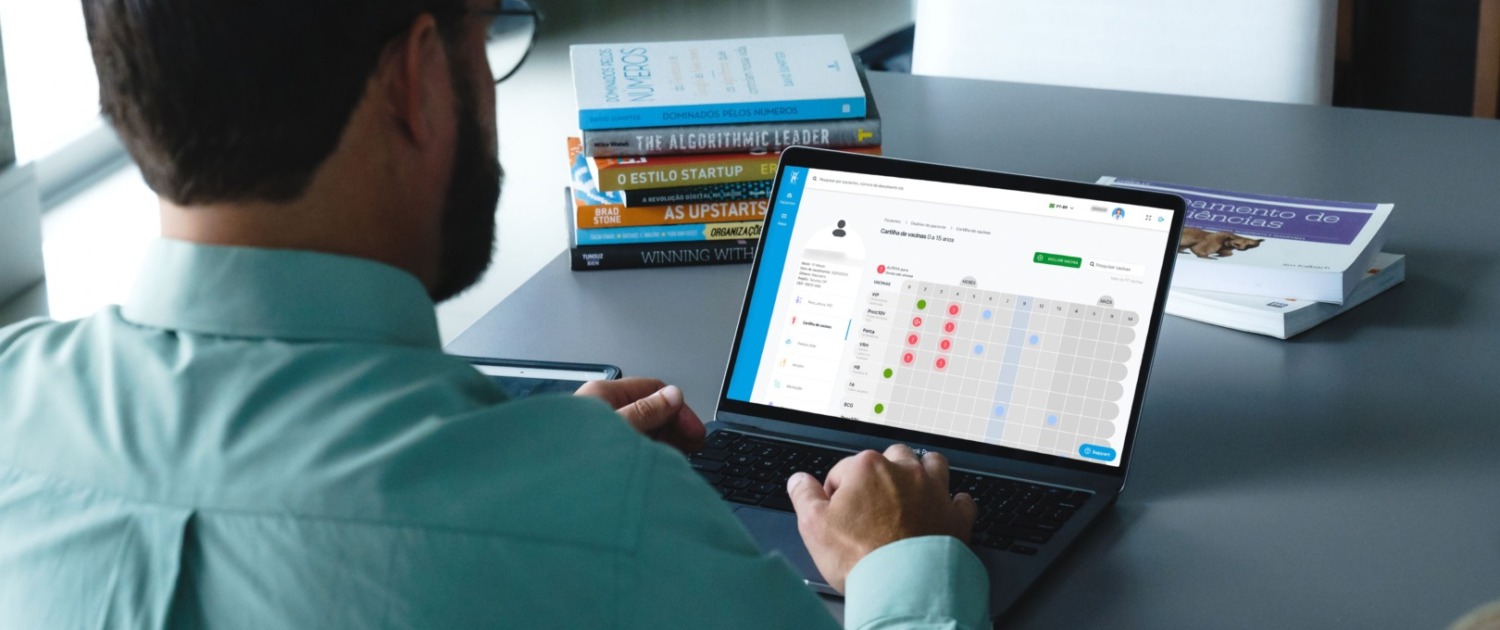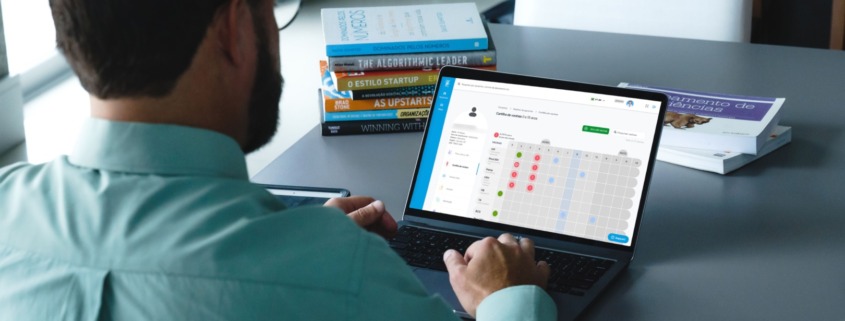Brazilian technology increases annual child vaccination rate by 8.4%
Last Updated on 5 de December de 2023 by Helen Albernaz

A technology developed by Portal Telemedicine has shown the potential to increase the child vaccination rate by 8.4% within a year. This result was achieved after a three-month pilot project in the municipality of Tarumã (SP). The Brazilian company was one of the nine organizations worldwide selected by the United Nations Children’s Fund (UNICEF) Venture Fund to develop an artificial intelligence (AI) solution to improve child development indicators.
Over the course of a year and a half, a solution was developed to compile vaccination data and create a map that issues red alerts for children with a higher number of delayed vaccines. The solution also highlights regions where the situation is more concerning. This enables community healthcare workers and public officials to have a comprehensive and simplified overview of the situation, providing a basis for faster measures to increase vaccine coverage.
Tarumã, a city with 15,000 inhabitants located in the countryside of São Paulo State, was chosen for the solution’s pilot implementation. The pilot project involved 3,876 children aged 0 to 15 years, generating 3,544 alerts related to the two vaccines provided by the Previne Brasil program. Each delayed vaccine triggers a separate alert, meaning a single child can have multiple alerts.
The initial results were collected after the first three months of implementation (July, August, and September), during which there was a 3% increase in vaccine coverage, rising from 53% to 56%. This 0.7% monthly increase indicates the potential for an 8.4% annual growth in vaccine coverage with the solution.
Considering only the two vaccines of the Previne Brasil protocol, inactivated and pentavalent polio, the percentage increase was even greater, ranging from 50% to 54% in 3 months. Previne Brasil is a federal government program that provides a financing model from the Ministry of Health for municipalities that meet goals related to primary care.
Initial impact on child vaccination rate
Project leader Taciane Vendrusculo emphasizes that the data is still preliminary, considering the short implementation period. Further testing is necessary to ascertain the solution’s impact and to identify any seasonal or external factors influencing the results.
“Although the results are still preliminary, they demonstrate the potential impact of compiling this data. The implementation of the solution alone has an impact on public authorities, compelling them to better organize health information and recognize the importance of having these records registered in the system. In addition to real-time monitoring of vaccine coverage, this technology enables them to quickly measure the effect of actions, such as vaccination campaigns or visits by community healthcare workers to areas with higher delay rates,” explains Taciane.
Tarumã’s Health Secretary, Elvira Alice Gozze da Silva, describes the use of the technology developed by Portal Telemedicine as “lifting a blindfold,” as it allowed her to see data she previously didn’t have access to. It also enabled the identification of issues related to information recording in the municipality’s system and the bottlenecks in child vaccination.
Elvira explains that after the system implementation, the first discovery was that the municipality’s vaccination rate was better than what appeared in e-Sus (the system used by the federal government). Based on the data, the municipality started actively searching for children with delayed vaccines and found that some had received the doses, but they were not recorded in the digital system.
“This was the key aspect of this technology: how can we manage effectively without access to data? This mapping allowed us to have a precise diagnosis, as well as insight into various situations, such as some 10-year-olds who hadn’t received an important vaccine at age 3, and children from other states with no registered vaccines,” explains the secretary.
With this diagnosis, the municipality organized a large vaccination campaign in October. Children who received vaccinations received tickets to participate in a joyous parade. Elvira celebrates that the event was a success, with more than 500 children participating.
“We planned this event based on the data we had. First, we chose the location by identifying the area with the highest number of delayed vaccines on the map and strategically selected a nearby place for the event. Another thing we noticed through active searching is that some mothers don’t vaccinate their children due to the difficulty of taking them to the health center on a weekday during working hours. That’s why we held the event on a Saturday.”
Elvira is confident that Portal’s solution will help the municipality achieve the 95% childhood vaccination target more quickly. She asserts that in the next three months, the vaccination coverage rate will significantly increase due to these initiatives.
Global challenge in health data management
The main implementation challenge of the project was gathering health data digitally. The pilot project’s location, Tarumã, is a national reference in using technology to improve health indicators.
In addition to teleconsultation services for the population, the municipality utilizes telemedicine to remotely issue electrocardiogram reports. This initiative resulted in a 45% reduction in deaths from non-communicable chronic diseases, such as acute myocardial infarction, within a year. It also earned recognition for the municipality from the Government of São Paulo as an inspiring initiative to be followed in the state.
One of the main challenges faced by the municipality in entering data into the system is registering immunizations that are only documented in paper vaccination cards, a practice that persisted until the adoption of the digital system.
“Throughout the project, we identified the need to develop a feature that was not initially planned for data reading. Our technology allows data to be manually entered into the system, such as previous vaccines that were only recorded in physical vaccination cards. If there is another phase of this project, we aim to develop AI capable of scanning data from these documents to automate this process more efficiently,” explains Rodrigo Toledo, Machine Learning Engineer at Portal Telemedicine.
Open-Source Project
The project, conducted in collaboration with the UNICEF Venture Fund, is open-source, allowing developers worldwide to contribute to its development.
Portal aims to expand its collaboration with UNICEF and is actively seeking international partners who can assist in funding the expansion of this initiative to other countries, as well as the enhancement of the tool.
A potential next phase of the project also includes the development of technology for automatic issuance of alerts to parents and guardians of children with delayed vaccines, emphasizing the importance of timely updates.
Global Issue
The decline in childhood vaccination coverage is a global problem highlighted by the World Health Organization (WHO) and is linked to the resurgence of diseases previously eradicated. Besides health protection, immunization measures are crucial for preventive actions, preventing larger public spending due to the worsening of diseases that could be avoided or mitigated through immunization.
According to a Unicef report, every dollar spent on vaccination yields a return on investment of $26. The same study reveals that 1 in 5 children worldwide has delayed or no vaccinations, leaving them vulnerable to several preventable diseases.
Brazil ranks 12th globally with 26% of children having received no vaccines. Unicef emphasizes that immunization is one of the most effective public health interventions globally, preventing 2 to 3 million child deaths annually.
Child Development Project
Portal Telemedicine was one of the nine companies globally chosen by the United Nations Children’s Fund (UNICEF) Venture Fund to develop an artificial intelligence (AI) solution to improve child development indicators. The company is part of the cohort of startups developing AI-powered education and healthcare solutions for the institution.
The selection of Portal Telemedicine by UNICEF Venture Fund, which funded the project, followed a rigorous selection process involving multiple stages, aiming to develop an AI solution to enhance child development indicators.
In Brazil, only two companies were selected out of more than 450 proposals from over 75 countries in the UNICEF program.
About Portal Telemedicine
The Brazilian healthcare technology company has been operating in the market for 10 years, enabling doctors to analyze exams through AI (Artificial Intelligence) and Machine Learning automations, providing accurate, fast, and low-cost medical reports, all remotely.
With the platform developed by the company, clinics, hospitals, health centers, and patients can connect with renowned doctors who can issue remote reports and provide teleconsultation services.
Since the beginning of the Covid-19 pandemic, Portal Telemedicine has adapted its algorithms to detect the coronavirus in pulmonary imaging exams (X-rays) with 90% accuracy. Portal processes thousands of exams per day, providing quality healthcare to patients in more than 900 cities in Brazil and Africa, where access to medicine is more challenging.
The health tech company is supported by Google. In 2019, the company was recognized by the UN as one of the top 10 companies in the world for accelerating the 2030 Sustainable Development Goals.
In 2021, Portal received the Top Global Telemedicine Solution award from Healthcare Tech Outlook Magazine and was named one of the 50 most trustworthy companies in the world by Silicon Review.




